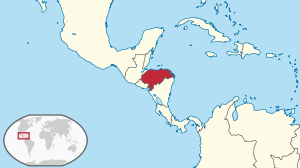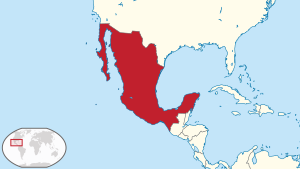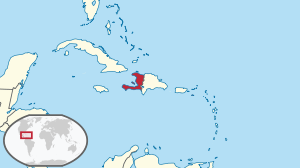United States involvement in regime change encompasses both overt and covert actions aimed at altering, replacing, or preserving foreign governments.
Overt involvements[]
Many interventions have included overt support or opposition to specific regimes.
Prior to 1895[]
- 1846 U.S. - Mexico War. The Mexican–American War was an armed conflict between the United States of America] and Mexico from 1846 to 1848 in the wake of the 1845 U.S. annexation of Texas, which Mexico considered part of its territory despite the 1836 Texas Revolution.
- American forces occupied New Mexico and California, then invaded parts of Northeastern Mexico and Northwestern Mexico; Another American army captured Mexico City, and the war ended in victory of the U.S.
- The Treaty of Guadalupe Hidalgo specified the major consequence of the war: the forced Mexican Cession of the territories of Alta California and New Mexico to the U.S. in exchange for $18 million. In addition, the United States forgave debt owed by the Mexican government to U.S. citizens. Mexico accepted the loss of Texas and thereafter cited the Rio Grande as its national border.
- 1865 America civil war Victory of US over CSA establishes United States as a nation-state, prompts the beginning of Reconstruction.
- 1887 Samoa. The Samoan crisis was a confrontation between the United States, Germany and Great Britain from 1887–1889 over control of the Samoan Islands during the Samoan Civil War.[1] The Samoan Civil War continued, involving Germany and the Americans, eventually resulting, via the Tripartite Convention of 1899, in the partition of the Samoan Islands into American Samoa and German Samoa.[2][3]
- 1893 Hawaii. The overthrow of the Kingdom of Hawaii refers to an event of January 17, 1893, in which anti-monarchial elements within the Kingdom of Hawaii, composed largely of American citizens, engineered the overthrow of its native monarch, Queen Lili'uokalani. Hawaii was initially reconstituted as an independent republic, but the ultimate goal of the revolutionaries was the annexation of the islands to the United States, which was finally accomplished in 1898.
1895-1917[]
- 1898 Cuba and Puerto Rico, as part of the Spanish-American War, U.S. intervention in Cuba and invasion of Puerto Rico in 1898. Cuba was occupied by the U.S. from 1898-1902 under military governor Leonard Wood, and again from 1906–1909, 1912 and 1917–1922; governed by the terms of the Platt Amendment through 1934.
The Puerto Rican Campaign was an American military sea and land operation on the island of Puerto Rico during the Spanish–American War. The United States Navy attacked the archipelago’s capital, San Juan. Though the damage inflicted on the city was minimal, the Americans were able to establish a blockade in the city’s harbor, San Juan Bay. The land offensive began on July 25 with 1,300 infantry soldiers.
All military actions in Puerto Rico were suspended on August 13, after U.S. President William McKinley and French Ambassador Jules Cambon, acting on behalf of the Spanish government, signed an armistice whereby Spain relinquished its sovereignty over the territories of Puerto Rico, Cuba, the Philippines and Guam.
- 1899 Philippines, the Philippine-American War was part of a series of conflicts in the Philippine struggle for independence. Fighting erupted between U.S. and Filipino revolutionary forces on February 4, 1899, and quickly escalated into the 1899 Battle of Manila. On June 2, 1899, the First Philippine Republic officially declared war against the United States.[4] The war officially ended on July 4, 1902.[5]
- 1900 China. The Boxer Rebellion was a proto-nationalist movement in China between 1898 and 1901. The US was part of an Eight-Nation Alliance that brought 20,000 armed troops to China, defeated the Imperial Chinese Army, and captured Beijing. The Boxer Protocol of 7 September 1901 ended the uprising.[6]
- 1903 Panama. In 1903, Panama seceded from the Republic of Colombia, backed by the U.S. government,[7] amidst the Thousand Days' War. The Panama Canal was under construction by then, and the Panama Canal Zone, under United States sovereignty, was then created. The zone was transferred to Panama in 2000.
- 1903 Honduras, where the United Fruit Company and Standard Fruit Company dominated the country's key banana export sector and associated land holdings and railways, saw insertion of American troops in 1903, 1907, 1911, 1912, 1919, 1924 and 1925.[8] Writer O. Henry coined the term "Banana republic" in 1904 to describe Honduras.
- 1912 Nicaragua, which, after intermittent landings and naval bombardments in the previous decades, was occupied by the U.S. almost continuously from 1912 through 1933.
- 1914 Mexico , US troops occupied Veracruz. See also United States involvement in the Mexican Revolution.
- 1915 Haiti. Haiti was occupied by the U.S. from 1915–1934, which led to the creation of a new Haitian constitution in 1917 that instituted changes that included an end to the prior ban on land ownership by non-Haitians. Including the First and Second Caco Wars.[9]
- 1916 Dominican Republic, actions in 1903, 1904, and 1914; occupied by the U.S. from 1916-1924.
- 1917 Virgin Islands. In 1917, a treaty was concluded in which the United States purchased the islands for $25,000,000 (about $390,000,000 in 2010 dollars)[citation needed]. After the United States bought what is now known as the United States Virgin Islands from the Danish, the islands became an unincorporated U.S. territory.
Since World War I[]
- 1917 The Great War / World War I was a global war centered in Europe that began on 28 July 1914 and lasted until 11 November 1918. The United States entered the war in April 1917.
- The Aftermath of World War I saw drastic political, cultural, and social change across Europe, Asia, Africa, and even in areas outside those that were directly involved in the war. Four empires collapsed due to the war, old countries were abolished, new ones formed, boundaries were redrawn. The Great War saw changes of government in Russia, Germany, Austria-Hungary, the Ottoman Empire, China, Mexico, Greece, Ireland, and Egypt.
- 1918 Russia. The Allies intervened in the Russian Civil War. About 250,000 foreign troops were present in Russia during the civil war. Among the allied forces included 13,000 American troops (in the Arkhangelsk and Vladivostok regions).
- 1941 World War II, (Northern Mariana Islands)
- 1953 Iranian coup d'état (known in Iran as the 28 Mordad coup[10]) was the overthrow of the democratically elected government of Iranian Prime Minister Mohammad Mosaddegh on 19 August 1953, orchestrated by the intelligence agencies of the United Kingdom (under the name 'Operation Boot') and the United States (under the name TPAJAX Project).[11][12] The coup saw the transition of Mohammad-Rezā Shāh Pahlavi from a to an authoritarian one who relied heavily on United States support to hold on to power until his own overthrow in February 1979.[13]
- 1958 Lebanon crisis. The President of the United States, Eisenhower authorized Operation Blue Bat on July 15, 1958. This was the first application of the Eisenhower Doctrine under which the U.S. announced that it would intervene to protect regimes it considered threatened by international communism. The goal of the operation was to bolster the pro-Western Lebanese government of President Camille Chamoun against internal opposition and threats from Syria and Egypt.
- 1961 Cuba Bay of Pigs Invasion The Bay of Pigs Invasion was an unsuccessful action by a CIA-trained force of Cuban exiles to invade southern Cuba, with support and encouragement from the US government, in an attempt to overthrow the Cuban government of Fidel Castro. The invasion was launched in April 1961, three months after John F. Kennedy assumed the presidency in the United States. The Cuban armed forces, trained and equipped by Eastern Bloc nations, defeated the invading combatants within three days.
- 1965 Dominican Republic. U.S. President Lyndon B. Johnson, convinced of the defeat of the Loyalist forces and fearing the creation of "a second Cuba"[14] on America's doorstep, ordered U.S. forces to restore order. The decision to intervene militarily in the Dominican Republic was Lyndon Johnson's personal decision. All civilian advisers had recommended against immediate intervention hoping that the Loyalist side could bring an end to the civil war.
- President Johnson took the advice of his Ambassador in Santo Domingo, W. Tapley Bennett, who suggested that the US interpose its forces between the rebels and those of the junta, thereby effecting a cease-fire. Chief of Staff General Wheeler told a subordinate: "Your unannounced mission is to prevent the Dominican Republic from going Communist."[15] A fleet of 41 vessels was sent to blockade the island, and an invasion was launched. Ultimately, 42,000 soldiers and marines were ordered to the Dominican Republic.
- 1989 Panama The United States Invasion of Panama, code-named Operation Just Cause, was the invasion of Panama by the United States in December 1989. It occurred during the administration of George H. W. Bush, and ten years after the Torrijos–Carter Treaties were ratified to transfer control of the Panama Canal from the United States to Panama by the year 2000.
- During the invasion, de facto Panamanian leader, general, and dictator Manuel Noriega was deposed, president-elect Guillermo Endara sworn into office, and the Panamanian Defense Force dissolved.
- 1991 Kuwait - The Persian Gulf War (2 August 1990 – 28 February 1991), codenamed Operation Desert Storm (17 January 1991 – 28 February 1991) commonly referred to as simply the Gulf War, was a war waged by a UN-authorized coalition force from 34 nations led by the United States, against Iraq in response to Iraq's invasion and annexation of Kuwait.
- 2011 Libya. The US was part of a multi-state coalition that began a military intervention in Libya to implement United Nations Security Council Resolution 1973, which was taken in response to events during the Libyan civil war,[16] and military operations began, with US and British naval forces firing over 110 Tomahawk cruise missiles,[17] the French and British Air Forces[18] undertaking sorties across Libya and a naval blockade by Coalition forces.[19] Air strikes against Libyan Army tanks and vehicles by French jets were since confirmed.[20][21]
Covert involvements[]
During the modern area, Americans were involved in numerous covert actions to support international regime change. During the Cold War era, American influence helped support change of regime in Syria in 1949, Iran in 1953, Guatemala in 1954, Brazil in 1964.
References[]
- ↑ Stevenson, Robert Louis (1892). A Footnote to History: Eight Years of Trouble in Samoa. BiblioBazaar. ISBN 1-4264-0754-8.
- ↑ Ryden, George Herbert. The Foreign Policy of the United States in Relation to Samoa. New York: Octagon Books, 1975. (Reprint by special arrangement with Yale University Press. Originally published at New Haven: Yale University Press, 1928), p. 574; the Tripartite Convention (United States, Germany, Great Britain) was signed at Washington on 2 December 1899.
- ↑ Ryden, George Herbert. The Foreign Policy of the United States in Relation to Samoa. New York: Octagon Books, 1975. (Reprint by special arrangement with Yale University Press. Originally published at New Haven: Yale University Press, 1928), p. 574; the Tripartite Convention (United States, Germany, Great Britain) was signed at Washington on 2 December 1899 with ratifications exchanged on 16 February 1900
- ↑ Kalaw 1927, pp. 199–200
- ↑ Worcester 1914, p. pageno=180 180
- ↑ Spence, In Search of Modern China, pp. 230–235; Keith Schoppa, Revolution and Its Past, pp. 118–123.
- ↑ In a state speech in December 1903, President Roosevelt put the number of "revolutions, rebellions, insurrections, riots, and other outbreaks" in Panama at 53, within the space of 57 years. in "Theodore Roosevelt's third state of the union address":http://en.wikisource.org/wiki/Theodore_Roosevelt%27s_Third_State_of_the_Union_Address
- ↑ http://www2.truman.edu/~marc/resources/interventions.html
- ↑ GILES A. HUBERT, WAR AND THE TRADE ORIENTATION OF HAITI, http://www.jstor.org/stable/pdfplus/1053341.pdf
- ↑ The date of the coup in the Persian calendar.
- ↑ CLANDESTINE SERVICE HISTORY: OVERTHROW OF PREMIER MOSSADEQ OF IRAN, Mar. 1954: p iii.
- ↑ Ends of British Imperialism: The Scramble for Empire, Suez, and Decolonization. I.B.Tauris. 2007. pp. 775 of 1082. ISBN 9781845113476. http://books.google.com/books?id=NQnpQNKeKKAC&pg=PA775&lpg=PA775.
- ↑ U.S. foreign policy in perspective: clients, enemies and empire. David Sylvan, Stephen Majeski, p.121.
- ↑ Stephen G. Rabe, "The Johnson Doctrine", Presidential Studies Quarterly 36
- ↑ "Foreign Relations of the United States, 1964–1968 Volume XXXII, Dominican Republic; Cuba; Haiti; Guyana, Document 43". US Dept. of State. http://history.state.gov/historicaldocuments/frus1964-68v32/d43. Retrieved 2011-04-26.
- ↑ "Security Council Approves 'No-Fly Zone' over Libya, Authorizing 'All Necessary Measures' To Protect Civilians in Libya, by a Vote of Ten For, None Against, with Five Abstentions". United Nations. 17 March 2011. Archived from the original on 19 March 2011. http://web.archive.org/web/20110319093321/http://www.un.org/News/Press/docs/2011/sc10200.doc.htm. Retrieved 19 March 2011.
- ↑ "Libya Live Blog – March 19". Al Jazeera. 19 March 2011. Archived from the original on 19 March 2011. http://www.webcitation.org/5xJ4lwmv0. Retrieved 19 March 2011.
- ↑ "Libya: US, UK and France attack Gaddafi forces". BBC News. 20 March 2011. Archived from the original on 20 March 2011. http://web.archive.org/web/20110320053754/http://www.bbc.co.uk/news/world-africa-12796972. Retrieved 20 March 2011.
- ↑ "French Fighter Jets Deployed over Libya". CNN. 19 March 2011. Archived from the original on 22 March 2011. http://web.archive.org/web/20110322025841/http://edition.cnn.com/2011/WORLD/africa/03/19/libya.civil.war. Retrieved 19 March 2011.
- ↑ "France Uses Unexplosive Bombs in Libya: Spokesman". 29 April 2011. http://news.xinhuanet.com/english2010/world/2011-04/29/c_13850700.htm. Retrieved 29 April 2011.
- ↑ Gibson, Ginger (8 April 2011). "Polled N.J. Voters Back Obama's Decision To Establish No-Fly Zone in Libya". The Star-Ledger. http://www.nj.com/news/index.ssf/2011/04/nj_voters_back_obamas_decision.html. Retrieved 29 April 2011.
The original article can be found at United States involvement in regime change and the edit history here.





















